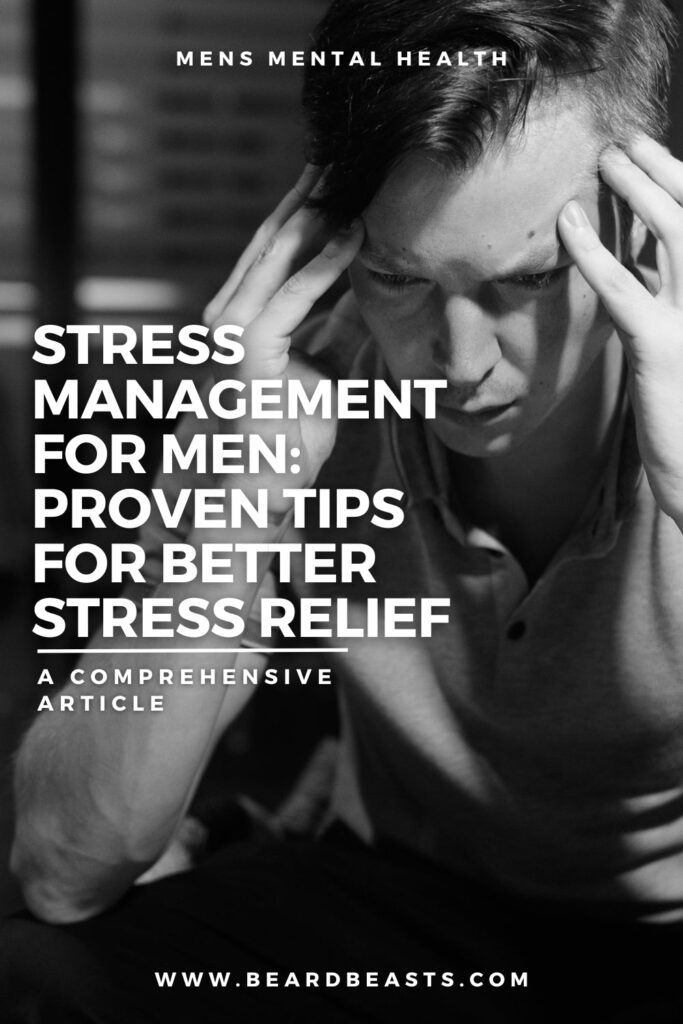Are you feeling overwhelmed, constantly stressed, or just not quite yourself lately? Stress management for men is crucial for maintaining men’s mental health and overall well-being, but finding the right techniques can sometimes feel challenging.
In this article, we’ll explore practical tips, proven strategies, and easy-to-apply methods for achieving effective stress relief for men. Let’s dive in and discover how you can take control of stress and live a more balanced life.
Understanding Stress in Men
Stress is something we all deal with, but when it comes to men, stress can show up in unique ways due to different life pressures and expectations. Let’s break it down to understand what stress is, what causes it, and how it can manifest in men’s lives.

What is Stress?
In simple terms, stress is your body’s natural response to challenges or demands. Think of it as your internal alarm system going off when things get tough. It’s not always a bad thing—stress can push you to meet deadlines, prepare for a big presentation, or react quickly in emergencies. However, when stress becomes a constant part of your life, it can start to take a toll on your health and well-being.
Common Causes of Stress in Men
There are several factors that commonly contribute to stress in men:
- Work-Related Stress: Long hours, tight deadlines, and high expectations at work create significant pressure, whether you’re aiming for a promotion or just trying to keep your job. Financial Pressures: Managing bills, debt, and savings can cause significant stress, leading to sleepless nights and constant worry. Relationship Challenges: Conflicts with partners, family, or friends can be a major stress source for men. Health Concerns: Physical health issues or the pressure to stay strong and fit can add to stress, especially when health problems arise.
Understanding these common causes is a key part of stress management for men. Recognizing what triggers your stress is the first step in managing it effectively.
How Stress Manifests in Men
Stress doesn’t just live in your mind; it shows up in your body, emotions, and behavior too. Here’s how stress can manifest in men:
- Physical Symptoms:
- Headaches: Stress can cause tension headaches or migraines.
- Fatigue: Feeling constantly tired, even after a good night’s sleep.
- Sleep Issues: Trouble falling asleep, staying asleep, or waking up too early.
- Emotional Symptoms:
- Irritability: Feeling more easily annoyed or frustrated than usual.
- Anxiety: Constant worrying or feeling overwhelmed by tasks.
- Depression: Persistent feelings of sadness, hopelessness, or lack of interest in activities you once enjoyed.
- Behavioral Symptoms:
- Substance Abuse: Turning to alcohol, drugs, or smoking as a way to cope with stress.
- Anger: Increased anger or outbursts over small issues.
- Withdrawal: Pulling away from friends, family, or activities you used to enjoy.
These symptoms are your body’s way of telling you that something needs to change. By recognizing these signs, you can take steps toward finding successful stress relief for men and improving your overall mental health.
The Importance of Stress Management
Managing stress is essential not just for immediate relief but for protecting your long-term health and well-being. Here’s why stress management for men matters:

Long-Term Effects of Unmanaged Stress
Uncontrolled stress can lead to serious health problems:
- Physical Health Risks:
- Heart Disease: Chronic stress increases the risk of heart issues.
- High Blood Pressure: Stress hormones can raise blood pressure, leading to heart disease and stroke.
- Mental Health Impact:
- Anxiety: Persistent stress can result in chronic anxiety, making relaxation difficult.
- Depression: Long-term stress can contribute to depression, affecting your overall outlook on life.
Without proper stress management, these risks can significantly affect men’s mental health and physical well-being.
Benefits of Effective Stress Management
Managing stress effectively offers numerous benefits:
- Improved Well-Being: Reducing stress leads to better physical and mental health, more energy, and a happier life.
- Better Relationships: Lower stress levels make you more patient and communicative, strengthening your relationships.
- Increased Productivity: Managing stress enhances focus and productivity, helping you perform better at work and in personal projects.
In essence, stress relief for men is about avoiding negative outcomes and enjoying a healthier, more productive life. Start managing stress today to see these benefits in your daily life.
Practical Stress Management Techniques for Men
Managing stress effectively doesn’t have to be complicated. Here are some straightforward strategies that can make a big difference in your life.
Physical Activities
1. Exercise and Fitness:
- Benefits of Regular Exercise: Activities like jogging, weightlifting, and sports boost your mood and reduce stress by releasing endorphins.
- Incorporating Fitness Daily: Make exercise a habit, whether it’s a morning run or a quick workout during lunch. Consistency is key to stress management for men.
2. Outdoor Activities:
- Nature’s Calming Effect: Spending time outdoors—whether hiking, fishing, or gardening—naturally reduces stress and enhances men’s mental health.
3. Breathing Exercises and Meditation:
- Mindfulness and Meditation: Simple practices like meditation and deep breathing can quickly calm your mind and reduce stress.
Mental and Emotional Strategies
1. Mindfulness and Relaxation:
- Daily Practice: Spend a few minutes each day being mindful of your thoughts and feelings. Progressive muscle relaxation also helps ease tension.
2. Time Management and Prioritization:
- Better Time Management: Prioritize tasks and set realistic goals. Establishing boundaries is essential to prevent overwhelm.
3. Healthy Relationships and Communication:
- Express Emotions: Don’t bottle up feelings—share them with someone you trust. Clear communication reduces stress in relationships.
Lifestyle Changes
1. Healthy Diet and Nutrition:
- Stress-Reducing Foods: Incorporate leafy greens, nuts, and fatty fish into your diet. Stay hydrated and eat balanced meals to support stress relief for men.
2. Adequate Sleep:
- Importance of Sleep: Aim for 7-9 hours of quality sleep to help your body recover and manage stress better. Establish a calming bedtime routine.
3. Reducing Alcohol and Substance Use:
- Healthier Alternatives: Instead of turning to alcohol or substances, opt for exercise, meditation, or hobbies to relieve stress.
By applying these techniques, you can effectively manage stress and improve your overall well-being. Start small, stay consistent, and notice the positive changes in your life.
Creating a Personal Stress Management Plan
Developing a stress management plan tailored to your needs is essential for long-term well-being. Here’s a simple guide to get started.
Assessing Individual Stress Levels
Understanding your stress is the first step in managing it:
- Self-Assessment Tools: Use online stress tests like this one or apps to gauge your stress levels.
- Journaling: Track daily stressors and reactions in a journal to identify patterns.
- Physical and Emotional Check-Ins: Regularly assess how you’re feeling to stay aware of your stress.
Developing a Customized Plan
Create a plan that fits your lifestyle and needs:
- Set Realistic Goals: Start with small, manageable goals, like 10 minutes of daily meditation.
- Balanced Approach: Incorporate a mix of activities:
- Physical: Exercise regularly.
- Mental: Practice mindfulness.
- Lifestyle: Prioritize sleep and nutrition.
- Stay Flexible: Adjust your plan as needed to ensure it remains effective.
Staying Consistent
Consistency is crucial for long-term stress management:
- Importance of Routine: Regular practice of stress-relief techniques leads to better results.
- Maintaining Motivation:
- Start Small: Begin with one or two techniques and build from there.
- Track Progress: Logging your progress helps maintain focus.
- Reward Yourself: Celebrate small victories to stay motivated.
By following these steps, you can create a personal stress management plan that’s effective and sustainable, helping you achieve better stress management and improved men’s mental health.
Additional Tips and Strategies
Here are some extra strategies to enhance your stress management and boost your overall well-being.
Building a Support Network
Social connections are key to managing stress:
- Reach Out: Share your feelings with friends or family for instant relief.
- Join Groups: Connect with others through clubs or support groups.
A strong support network is vital for men’s mental health.
Setting Boundaries
Protect your time and energy:
- Prioritize: Focus on what matters most.
- Communicate Clearly: Let others know when you need personal time.
Boundaries help prevent burnout and keep stress levels down.
Learning to Say No
Saying no is essential for avoiding burnout:
- Be Honest: Decline tasks that overwhelm you.
- Practice: Get comfortable with prioritizing your well-being.
Learning to say no is crucial for effective stress relief for men.
The Role of Humor in Stress Management
Laughter is a great stress reliever:
- Watch Comedies: Enjoy funny movies or shows to lift your mood.
- Share a Laugh: Engage in light-hearted conversations with loved ones.
Humor can instantly reduce stress and improve your outlook.
Digital Detox
Unplugging helps reduce stress:
- Set Screen-Free Times: Designate hours without screens to improve relaxation.
- Disconnect Regularly: Take breaks from social media to reduce information overload.
A digital detox can significantly enhance your men’s mental health.
Incorporating these tips into your stress manangement routine—building support, setting boundaries, saying no, embracing humor, and unplugging—can greatly improve your stress management and overall well-being.
Seeking Professional Help
Sometimes managing stress requires more than just self-help strategies. Knowing when to seek professional help can make a big difference in your stress management.
When to Consider Therapy or Counseling
Consider therapy if:
- Stress Is Persistent: If stress feels overwhelming and constant despite your efforts.
- Physical Symptoms: Ongoing headaches, fatigue, or sleep issues without a clear cause.
- Emotional Struggles: Increased anxiety, irritability, or depression.
Types of Therapy that help with stress include:
- Cognitive Behavioral Therapy (CBT): Changes negative thought patterns.
- Mindfulness-Based Stress Reduction (MBSR): Combines mindfulness with relaxation.
- Talk Therapy: Discussing stressors can provide relief and new insights.
Therapy is a proactive step toward better men’s mental health and effective stress relief for men.
Support Groups and Resources
Support Groups offer:
- Peer Support: Connect with others who share similar experiences.
- Accountability: Regular attendance helps maintain stress management goals.
Online Resources and Hotlines:
- Forums: Online spaces for anonymous discussions on stress and mental health.
- Hotlines: 24/7 support, such as the National Suicide Prevention Lifeline (1-800-273-TALK).
These resources are valuable additions to your stress management plan.
Seeking professional help, whether through therapy or support groups, is a crucial step in managing stress and improving your overall well-being.

Frequently Asked Questions
Here’s a quick guide to common questions about stress management for men.
How to Reduce Men’s Stress?
- Exercise: Regular physical activity boosts mood and reduces stress.
- Mindfulness: Practices like meditation help calm the mind.
- Support Network: Connect with friends, family, or support groups for relief.
- Set Boundaries: Protect your time by saying no when necessary.
- Unplug: Take breaks from technology to reduce mental overload.
What Are the 5 Stress Management Techniques?
- Exercise: Releases tension and improves mood.
- Relaxation: Deep breathing, meditation, or yoga to reduce stress.
- Time Management: Prioritize tasks to avoid overwhelm.
- Social Support: Talk about stress with trusted individuals.
- Healthy Lifestyle: Eat well, sleep enough, and avoid excessive substances.
What Are the 4 A’s of Stress Management?
- Avoid: Steer clear of unnecessary stressors.
- Alter: Change your approach to stressful situations.
- Adapt: Adjust expectations to reduce stress.
- Accept: Focus on what you can’t change and move forward.
What Are the 3 C’s of Stress?
- Control: Focus on what you can control.
- Commitment: Stay true to your values and goals.
- Challenge: See stress as a challenge, not a threat.
These strategies and concepts are key to effective stress relief for men. Find what works best for you and stay consistent for better men’s mental health.
Conclusion
Managing stress is a journey, and it’s important to remember that you don’t have to tackle it all at once. By taking small, consistent steps, you can significantly improve your men’s mental health and overall well-being.
Here’s a quick recap of key strategies for effective stress management for men:
- Physical Activities: Regular exercise, spending time in nature, and practicing breathing techniques can greatly reduce stress.
- Mental and Emotional Strategies: Mindfulness, setting boundaries, and learning to say no are crucial for maintaining balance.
- Lifestyle Changes: Prioritizing sleep, eating well, and unplugging from technology contribute to long-term stress relief for men.
- Seeking Professional Help: Therapy, support groups, and online resources provide additional support when stress feels overwhelming.
- Understanding Key Concepts: Familiarize yourself with the 5 stress management techniques, the 4 A’s, and the 3 C’s of stress to better navigate stressful situations.
Remember, the most important part of stress management for men is finding what works best for you. Whether it’s through physical activity, mental strategies, or professional support, the goal is to create a sustainable routine that helps you lead a healthier, more balanced life.
Don’t hesitate to reach out for help when needed, and keep experimenting with different techniques until you find your perfect stress management mix. Your well-being is worth the effort.





